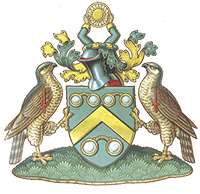Silver Medals
The Fincham Medal: Past Winners
A Silver medal was introduced in commemoration of the contribution to ophthalmic optics of
brothers
Walter and Edgar Fincham. The medal was designed to honour exceptional work by people “mid-career.” Six Fincham medals have been awarded to date, to:
Professor Neville McBrien PhD, FAAO, MCOptom, FBDO
(1995) – for his research into myopia, and in particular how the abnormal growth of the eye is
controlled in pathological myopia.
Dr Ian Flitcroft MA, DPhil, FRCOphth
(2002) – for his research on human accommodation, especially the nature of the visual stimuli that
drive accommodation and the relationship between binocular vision and accommodation reflex.
Professor Robin Ali PhD
(2004) – for his pioneering work on gene therapy, which revealed that animal vision could be
sustained and improved in animals with inherited retinal diseases by introducing normal genes using a
viral vector.
Dr James Bainbridge PhD FRCOpth
(2009) – for his successful trial of gene therapy in treating a particular form of genetically
induced blindness in humans.
Professor Alan Stitt PhD
(2017) – for his research on diabetic retinopathy and age-related retinal disease and his
pioneering work on re-vascularising ischaemic retina.
Professor Shahina Pardhan (2024) – for her research into the global visual impact of diabetic retinopathy on eye health
and vision and how vision loss affects navigation through environments, and for her continuing work championing equity and diversity in science.
Silver Medal criteria and process
Submissions are now invited for two different Silver Medals. Awards will be made at the discretion of the Court and may not be annual.
1. The
WCSM Silver Medal, with an accompanying purse, will be awarded to the person who, in
the opinion of our judging panel of professors, can most clearly demonstrate a sustained commitment to
better vision with a national or international impact over a period of at least 7 years since achieving a
doctorate or reaching an equivalent senior status in clinical practice. It is intended to recognise achievement by an individual midway through their career.
Applicants may be nominated by
department heads, or can self-nominate. Each application must explain clearly the individual's
personal contribution to alleviating or preventing vision impairment, in at least one of four
categories: Education, Research, Innovation or Clinical Leadership. The impact of their work must
be able to be evidenced through publication of a body of research, a record of success in higher level
teaching and education, development and roll-out of an innovative product or therapy or a record of
leadership in clinical practice. Additional weighting may be given to work which has involved work across
different professional eyecare disciplines and has had, or will have, multi-disciplinary impact.
Applicants will be expected to show continuing involvement in their field, building on past
achievements.
2. A
new Silver Medal for Innovation will recognise the work of an organisation or company which has developed and brought to market an innovative product or therapy which, and in the opinion of our judging panel, has made a significant difference to the improvement of vision or prevention of sight loss in more than one country of the world. Companies can nominate themselves or be nominated by professionals who are now using their product or therapy. Additional weighting may be given to work which has involved work across different professional eyecare disciplines and has had, or will have, multi-disciplinary impact. Companies will be expected to demonstrate continuing interest in developing further innovations to enable eye health professionals to improve the lives of those they are treating.
An on-line application form for the individual WCSM Silver Medal appears below.

